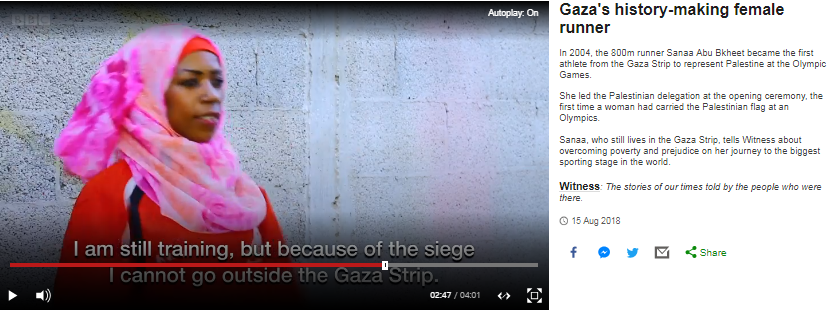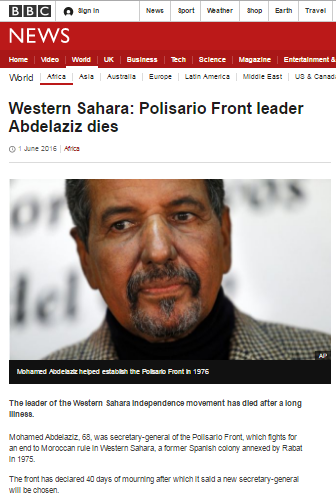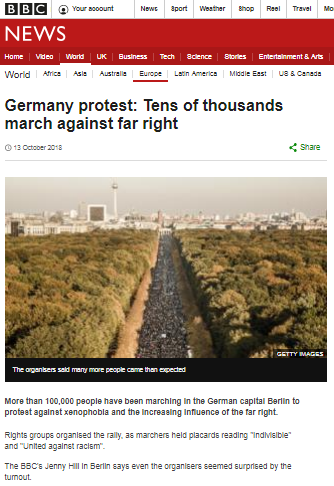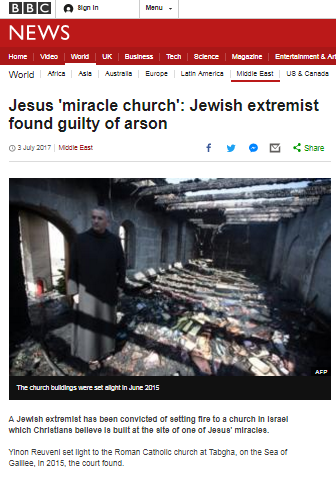BBC News website reporting on the so-called ‘Great Return March’ commenced on March 30th, peaked in May and has continued at a lesser intensity since then.
While during the first four months of reporting visitors to the website did not see any reporting from the Gaza Strip that was not specifically related to those events or other security-related issues, in the four months between August and November 2018, some more generalised reporting from Gaza appeared on the BBC News website.
Interestingly, all those reports included at least one of two specific themes. [emphasis added]
August 2018:
“Gaza’s history-making female runner“, 15/8/18, discussed here
“I’m still training but because of the siege I cannot go outside the Gaza Strip. I cannot compete in international races.” […] “For the past four years no athlete from Gaza has been able to take part in any event outside.”
“Bullet shatters Palestinian cyclist’s Asian Games dream”, 28/8/18, discussed here
“Alaa’s dream was to represent Palestine at the Asian Games. But an Israeli bullet put an end to his dream. On 30 March, Alaa was taking part in what has been called “The Great March of Return” at the Gaza-Israel frontier. The protest campaign expresses support for the declared right of Palestinian refugees to return to their ancestral homes in what is now Israel.”
September 2018:
“Gaza’s abandoned airport in ruins”, 12/9/18, discussed here
“The airport was destroyed by Israel during the Second Intifada. The International Civil Aviation Organisation condemned the destruction of the airport and urged Israel to allow it to reopen. Gaza currently has no functioning airports.”
“Gaza family: ‘Our children suffer to get a bottle of water’”, 27/9/18, discussed here
“There are fresh warnings about the humanitarian situation in Gaza, where there are severe water and power shortages.
A new World Bank report says the economy is in “free fall”.
Meanwhile, deadly protests have resumed along the Gaza-Israel border and the situation “could explode any minute”, according to Nickolay Mladenov, the UN Special Coordinator for the Middle East Peace Process.”
October 2018:
“Gaza: Coding in a conflict zone“, 1/10/18
“For more than a decade, since the Islamist movement Hamas took full control, Gaza has been kept under a tight blockade by Israel and Egypt, for what they say is their own security. There are controls on goods allowed in and out and on travel.” […]
“The protests began with a demand for Palestinians to return to their ancestral land that now lies in Israel, but many believe they have been fuelled by the desperate situation.”
“How coding is helping young Gazans find work“, 6/10/18
“Over a decade ago, a blockade of the Gaza Strip by Israel and Egypt was tightened, when the militant group, Hamas, took full control. Today, the local economy is broken and it’s difficult to get a permit to travel.”
“These young people are working their way around Gaza’s blockade.”
“Gaza grenade collector: ‘We’re planting life from death’“, 20/10/18, discussed here
“This is the border between Gaza and Israel. Palestinians have been protesting since March 2018 in support of the declared right of return for Palestinian refugees.”
“Gaza protest image likened to famous Delacroix painting”, 25/10/18, discussed here
“Palestinians in Gaza have been protesting weekly along the border with Israel since March. The protests, orchestrated by the territory’s militant Hamas rulers, are held in support of the declared right of Palestinian refugees to return to their ancestral homes in what is now Israel.”
November 2018:
“What is ‘Green Cake’ and why did this woman invent it?“, 2/11/18, discussed here
“[concrete blocks for building]…are usually made from cement, sand and gravel (or aggregate). But all that has to come from Israel which tightly restricts imports on security grounds.”
“Gaza Strip’s only concert grand piano makes music again“, 21/11/18, discussed here
“Gaza is blockaded by Israel and Egypt, who cite security concerns.”
As we see four of those ten reports concerning the Gaza Strip which appeared on the BBC News website between August and November inclusive included references to the so-called ‘right of return‘ – but without any explanation the true significance of that Palestinian demand.
Seven of the ten reports included portrayal of counter-terrorism measures in terms of restrictions (actual or not) on movement of people or goods and/or shortages perceived (rightly or not) to result from those measures, but without any proper explanation of the terrorism which made them necessary.
As the JCPA noted one month after the ‘Great Return March’ rioting had begun: [emphasis added]
“Khalil al-Hayya, a senior Hamas official and member of the Hamas political bureau, defined the three main objectives of the return marches in Gaza: inculcating the right of return among the Palestinian people and the younger generation, thereby giving a focus to the struggle against the “occupation;” torpedoing the “deal of the century,” President Trump’s diplomatic plan for resolving the Middle East conflict; and breaking the embargo on the Gaza Strip.”
Remarkably, all BBC reporting from the Gaza Strip throughout the past four months has amplified themes relating to at least one of those objectives.




